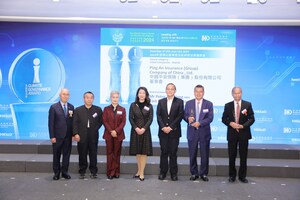Ping An: China's SMEs Need Financial and Technological Boost for Digital Transformation
HONG KONG and SHANGHAI, Nov. 10, 2020 /PRNewswire/ -- Ping An Insurance (Group) Company of China, Ltd. (hereafter "Ping An" or the "Group", HKEX: 02318; SSE: 601318) announced that the latest report from the Fudan-Ping An Research Institute for Macroeconomy has found China's small and medium-sized enterprises (SMEs) need a financial and technological boost to transform themselves for the digital economy.
The report, Digital Transformation: A Game-Changing Strategy to Alleviate the Plight of SMEs in China, found that SMEs in China have yet to fully adopt digital technologies, including artificial intelligence, big data and smart manufacturing, and the main barriers to adoption are high costs and tight budgets. The findings are based on a survey of 99 firms (86% of which have fewer than 50 employees in 2019) in a national economic zone in Shanghai in July 2020.
The sudden outbreak of COVID-19 brought unprecedented challenges to SMEs in China, but it also provided them with excellent opportunities to go digital. Digital transformation can eliminate information barriers between SMEs and financial institutions, reduce information asymmetry and alleviate financing difficulties. In March 2020, the Ministry of Industry and Information Technology (MIIT) issued a special action plan on digital empowerment of SMEs. The Fudan-Ping An Research Institute for Macroeconomy report confirms the necessity of this action plan and recommends that governments at all levels increase their support to large technology companies that are developing standardized digital services which meet the needs of SMEs, and provide tax cuts and financing facilities for SMEs' digital transformation projects.
The survey of SMEs in a national economic development zone in Shanghai found:
1. The digital maturity of the surveyed enterprises is low.
- More than two-thirds of the surveyed enterprises have not used artificial intelligence (AI) or big data in their production and business.
- Only 17% of the surveyed enterprises have done more than 50% of their total procurement online, and only 14% of the surveyed enterprises sell more than 50% of their total online.
- Less than 18% of the surveyed manufacturing enterprises are building smart production lines, smart workshops and smart factories.
- More than 64% of the surveyed enterprises have never used internet finance to obtain financing. Among the 35 surveyed companies that have used internet finance, only one company obtained more than 50% financing through this channel.
2. High costs and tight budgets are major obstacles to SMEs' digital transformation.
- More than one-third of the companies surveyed, 35%, said the biggest obstacle to digital transformation was high fees charged by service providers, while 30% said the biggest obstacle was a lack of funds.
- Yet 97% of the companies believe that digitalization can help improve their operating efficiency and development.
The report makes several policy recommendations for the digital transformation of SMEs:
1. Support large technology companies that are developing standardized digital services which meet the needs of SMEs. The large number of SMEs in China represents a significant market. In March 2020, MIIT proposed to cultivate and promote a number of digital platforms which meet the needs of small and medium-sized enterprises. This survey confirms the necessity of this special action plan.
2. Provide SMEs with tax cuts for digital transformation.
3. Guide financial institutions to provide cheap loans to SMEs for digital transformation projects. Digital transformation can eliminate information barriers between enterprises and financial institutions, reduce information asymmetry to help SMEs obtain more accurate credit assessments, and alleviate financing difficulties.
This is the third report in the SME Financing Report Series, which focuses on the problems facing micro, small and medium-sized enterprises (MSMEs) amid the COVID-19 pandemic, and makes mid- to long-term recommendations based on predictions of macroeconomic trends.
Download the full report: Digital Transformation: A Game-Changing Strategy to Alleviate the Plight of SMEs in China
About Ping An Group
Ping An Insurance (Group) Company of China, Ltd. ("Ping An") is a world-leading technology-powered retail financial services group. With over 214 million retail customers and nearly 579 million Internet users, Ping An is one of the largest financial services companies in the world.
Ping An has two over-arching strategies, "pan financial assets" and "pan health care", which focus on the provision of financial and health care services through our integrated financial services platform and ecosystems. Our "finance + technology" and "finance + ecosystem" strategies aim to provide customers and internet users with innovative and simple products and services using technology. As China's first joint stock insurance company, Ping An is committed to upholding the highest standards of corporate reporting and corporate governance. The Group is listed on the stock exchanges in Hong Kong and Shanghai.
In 2020, Ping An ranked 7th in the Forbes Global 2000 list and ranked 21st in the Fortune Global 500 list. Ping An also ranked 38th in the 2020 WPP Kantar Millward Brown BrandZTM Top 100 Most Valuable Global Brands list. For more information, please visit group.pingan.com.
About Fudan-Ping An Research Institute for Macroeconomy
The Fudan-Ping An Research Institute for Macroeconomy is an interdisciplinary platform for macroeconomics and finance, jointly established by Fudan University and Ping An Technology. The Institute has created a new model for sharing resources between first-class universities and first-class enterprises and complementing each other, and is committed to introducing the most cutting-edge technologies, such as artificial intelligence and big data, into research and applications in the macroeconomic field to build a world-leading think tank and research platform.






Share this article